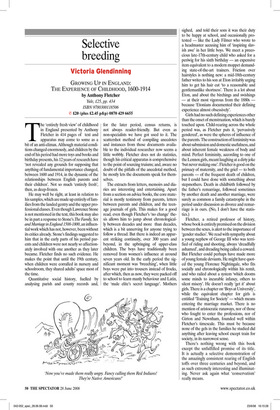Selective breeding
Victoria Glendinning
GROWING UP IN ENGLAND: THE EXPERIENCE OF CHILDHOOD, 1600-1914 by Anthony Fletcher Yale, £25, pp. 434 ISBN 9780300118506 ✆ £20 (plus £2.45 p&p) 0870 429 6655 The ‘entirely fresh view’ of childhood in England presented by Anthony Fletcher in 414 pages of text and apparatus may come to some as a bit of an anti-climax. Although material conditions changed enormously, and children by the end of his period had more toys and books and birthday presents, his 12 years of research have ‘not revealed any grounds for supposing that anything of fundamental importance changed, between 1600 and 1914, in the dynamic of the relationships between English parents and their children’. Not so much ‘entirely fresh’, then, as deep-frozen.
He may well be right, at least in relation to his samples, which are made up entirely of families from the landed gentry and the upper professional classes. Even though Lawrence Stone is not mentioned in the text, this book may also be in part a response to Stone’s The Family, Sex and Marriage in England 1500-1800, an influential work which has not, however, been without its critics already. Stone’s findings suggested to him that in the early parts of his period parents and children were not nearly so affectionately involved with one another as they later became. Fletcher finds no such evidence. He makes the point that until the 19th century, when children were corralled in nursery and schoolroom, they shared adults’ space most of the time.
Quantitative social history, fuelled by analysing parish and county records and, for the later period, census returns, is not always reader-friendly. But even as non-specialists we have got used to it. The scattershot method of compiling anecdotes and instances from those documents available to the individual researcher now seems a little wobbly. Fletcher does not do statistics, though his critical apparatus is comprehensive to the point of sourcing truisms; and, aware no doubt of the pitfalls of the anecdotal method, he mostly lets the documents speak for themselves.
The extracts from letters, memoirs and diaries are interesting and entertaining. Apart from a section on advice books, the core material is mostly testimony from parents, letters between parents and children, and the teenage journals of girls. This makes for a good read, even though Fletcher’s ‘no change’ thesis allows him to jump about chronologically between decades and more than decades, which is a bit unnerving for anyone trying to follow a thread. But there is indeed an apparent striking continuity, over 300 years and beyond, in the upbringing of upper-class children. The boys have traditionally been removed from women’s influence at around seven years old. In the early period the significant moment was ‘breeching’, when little boys were put into trousers instead of frocks, after which, then as now, they were packed off to school to learn manly behaviour and Latin, the ‘male elite’s secret language’. Mothers sighed, and told their sons it was their duty to be happy at school, and occasionally protested — like the Lady Filmer who wrote to a headmaster accusing him of ‘inspiring slavish awe’ in her little boys. We meet a precocious late-17th-century child who asked for a periwig for his sixth birthday — an expensive item equivalent to a modern moppet demanding state-of-the-art trainers. Friction over hairstyles is nothing new: a mid-18th-century father writes to his son at Eton irritably urging him to get his hair cut ‘to a reasonable and gentlemanlike shortness’. There is a lot about Eton, and about the birchings and swishings — at their most vigorous from the 1880s — because ‘Etonians documented their defining experience almost obsessively’.
Girls had no such defining experiences other than the onset of menstruation, which is barely touched upon. Child-rearing across the whole period was, as Fletcher puts it, ‘pervasively gendered’, as were the spheres of influence of the parents. The construction of femininity was about submission and domestic usefulness, and about inherent female weakness of body and mind. Perfect femininity, according to one of the Lennox girls, meant laughing at a dirty joke ‘but never making one’. Fletcher is good on the primacy of maternity, and the grief — to both parents — of the frequent death of children, but I could have done with something about stepmothers. Death in childbirth followed by the father’s remarriage, followed sometimes by another death and another marriage, were surely as common a family catastrophe in the period under discussion as divorce and remarriage is in ours. (No, I don’t have the statistics.) Fletcher, a retired professor of history, whose book is entirely premised on the division between the sexes, is alert to the importance of ‘gender studies’. We read with sympathy about a young nephew of George III who was terrified of riding and shooting, always ‘dreadfully ashamed’, and dreading being called a coward. But Fletcher could perhaps have made more of young female deviants. He might have quoted the young Florence Nightingale, who fits socially and chronologically within his remit, and who railed about a system ‘which dooms some minds to incurable infancy, others to silent misery’. He doesn’t really ‘get it’ about girls. There is a chapter on ‘Boys at University’, while the equivalent chapter for girls is entitled ‘Training for Society’ — which means entering the marriage market. There is no mention of aristocratic runaways, nor of those who fought to enter the professions, nor of Girton and Newnham, founded well within Fletcher’s timescale. This must be because none of the gels in the families he studied did anything after leaving school except train for society, in its narrowest sense.
There’s nothing wrong with this book except the unfulfilled promise of its title. It is actually a selective demonstration of the amazingly consistent rearing of English toffs over three centuries and beyond, and as such extremely interesting and illuminating. Never ask again what ‘conservatism’ really means.


















































































 Previous page
Previous page